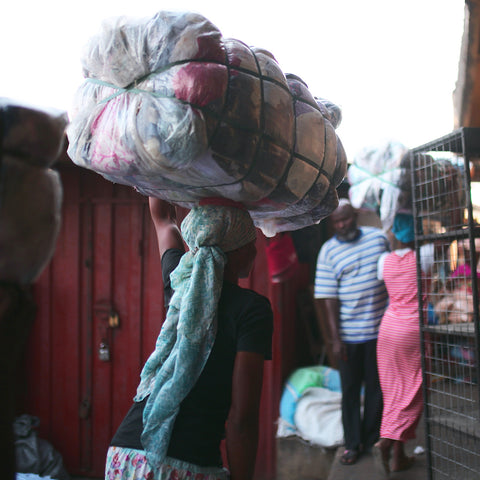Liz Ricketts | Co-Founder & Director of The OR Foundation
We've created powerful pants for powerful people because of the positive impact small, easy changes can make on you and your environment. So, we want to highlight some Everyday Radicals that strive to make a real, radical difference to their community and our ONE Earth.
Who better to start off this series than Liz Rickets, Co-founder and Director of The OR Foundation.

Liz is an educator, designer and strategist. Working within the industry as a designer and stylist, Liz witnessed the toxicity of fashion’s disposable culture firsthand and has since been dedicated to transforming the industry. And her work as a researcher and advocate for a Justice-Led Circular Economy has been published widely.
We're so inspired by the work Liz, and the OR Foundation, are doing and the profile she is raising on where our waste really goes.
Work
Your work crosses the divide between what we do in the global north as consumers and brand and how it impacts the global south – how do you manage that split?
Honestly, it’s becoming more and more difficult. When I am in Ghana there is clarity to what needs to be done and although we cannot tackle the crisis at the scale of the current damage, we are able to act towards tangible change every day. My team and I are forced to not only confront our limitations as individuals and as an organisation but to celebrate our limitations as evidence of the fact that it is only through radical trust and collaboration that anything real gets done.
Meanwhile, I find that the Global North is in a state of mass delusion thanks to well-funded greenwashing and a lifestyle that prioritizes individual status over consistent collective effort. There is so much cognitive dissonance as we are inundated with messages of crisis while also told that we can solve the crisis through our purchasing decisions.
People talk, talk, talk about sustainability in the Global North but few people intend to act on the things they are saying. There is so much ego, so much repetitive work, so much white fragility and so much money wasted in the Global North. We are wasting so much time proving things that should be common sense simply because privileged people fail to humble themselves and roll up their sleeves.
I don’t say this to be harsh. I say it because I can feel it myself when I am in the USA -- my mind grows foggy, I grow more insecure about saying things that are so obviously true to me when I am in Ghana and I overthink the simplest of actions.
The Global North needs to heal from our consumer-centric ways and we need to focus on what really matters. We need to ensure that everyone working across fashion’s supply chain earns a living wage and we need to make less clothing. If we aren’t working towards those two goals as an industry then the rest is just noise.
What do you feel your biggest achievements to date are with the work you've done so far in Kantamanto?
We have maintained trusting relationships and we have helped people working in Kantamanto to understand the system that they are a part of. This may not seem all that important to the average person but we believe real change will come when the community here is better equipped to advocate for themselves and we’ve made great progress to that end. I believe far too much energy, time, and money goes into educating privileged consumers in the Global North. Sure, raising awareness is necessary but I have seen, and firmly believe, that one empowered retailer in Kantamanto is worth thousands of informed consumersin the USA or Europe. Empowering retailers and kayayei is only possible if they feel that we are sincere, committed and if we follow through on what we say.
In terms of the work we are doing right now, I am most enthusiastic about our Chiropractic Research and Treatment program with kayayei who work in Kantamanto. The results are truly tragic and the experience as a whole, sobering, but we have seen that this approach really reaches the girls and we have been able to place several kayayei from this program into apprenticeships so they can transition to new lines of work. This program is also equipping us with valuable information that we can utilize for local advocacy and a policy agenda around head portering.

Impact
We’re now in a new age for the planet - Where we as a species are solely responsible for the fate of the entire planet. This is daunting and scary, are we over-sensitized to this information, is eco-anxiety impacting our response? How do we overcome it?
Step away from the screen, or from the constant flow of information and volunteer with an organization in your community. We have so many of the solutions we need but we lack the collective understanding to be able to implement them. The more we connect with our local community the easier it will be to apply research, organize for fundamental legislation, and implement holistic systems-level change. At this critical moment, I recommend planting your feet and focusing on the change you can make within a 100-mile radius of wherever you find yourself.3/ Are we at a crisis point in consumption? What are the stats and how can we change?
Middle and upper-class people, primarily in the Global North, are at a crisis point in consumption. When it comes to fashion we know that the average USA citizen is buying around 64 items a year, wearing about 20% of their clothes, and throwing clothing away after only a handful of wears. The good news is that this is not the majority of the population.
Big Fashion brands, the ones currently oversupplying the world with clothing that is essentially waste until proven otherwise, these companies must reduce production by at least 80% and invest in the collection, resale, repair, and upcycling of what already exists. Affluent consumers must define what “enough” means for them and cut down their purchases to focus on garments they will wear often garments made to circulate within current or near-developed circular infrastructure, and garments that are made by people who earn a living wage.

You've previously spoken about the circular economy as a capitalist-friendly system …
"It took what I consider more radical frameworks, in terms of biomimicry or cradle to cradle, and combined them to make an industry-friendly financial argument for saving the planet. It really concerns me because I think it gives these companies an out", -
https://www.fashiondenier.com/conversations/a-conversation-with-liz-ricketts
Have your opinions changed or evolved?
I don’t take issue with circularity as a theory but rather with how it is being applied and corrupted by big fashion companies. Currently, circularity in textiles is extractive, not regenerative. Most companies making rPET textiles are extracting raw resources (bottles) from dumpsites in the Global South where people are not paid well, where the job is unsafe, where there is no direct communication between laborers within the supply chain and the fashion brand, and where the bottles could have a more sustainable use outside of fashion. Bottles are extracted from dumpsites in places like Ghana because the labor is cheap and there is no oversight. That is not revolutionary, it is preservative. Brands want circular products to be as cheap, if not cheaper, than linear products. This cannot happen without the exploitation of land and people.
I think circularity was designed to advance capitalism and does not focus enough on limits or on the redistribution of wealth and power.
Do you think we can work together to re-address the balance between north and south with the circular economy model?
Footnote: We as a business work to circular model, but also try to embed cradle to cradle principals where we can.
We have to center justice within the circular economy. The most unnatural thing about fashion is not its materials, it is the consolidation of ideas, wealth, and other resources. If the circular economy fails to redistribute wealth and power, we will not succeed in bringing about a sustainable transition.
Our partnership is a small but meaningful step to that end. We all know that the technological infrastructure necessary for a circular economy is in its infancy globally but so far most of these solutions are being prioritized for communities in the Global North. This is unfair and counterproductive when the impacts of fashion’s waste crisis are felt most severely in the Global South. Through partnerships like ours, we can begin to redistribute resources. I think it is not only about financial resources but about sharing skills and expertise. I look forward to our team connecting with One Essentials to learn more about the business model and materials.
Aside from partnerships like this, we will only correct the imbalance through legislative efforts that make the behavior of today’s big fashion companies illegal and that secure financial reparation for their ongoing negligence.
Tips/ Lifestyle
5/ What would be your top tip for creating an everyday impact on our climate crisis.
Footnote – we have an everyday radical message where we like to give easy wins for consumers that have a big impact – this can be related to work if you like or just your own daily habit or routine.
Redistribute 1% of your income to communities on the front line of the climate crisis. Those who are closest to the problem know best what needs to be done but often lack the resources to implement solutions. If you are able, donating to front-line communities is truly critical.
You can learn more about Liz and The OR Foundation here.
